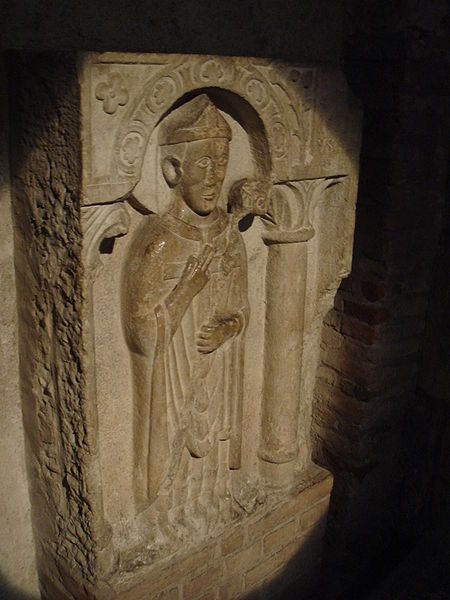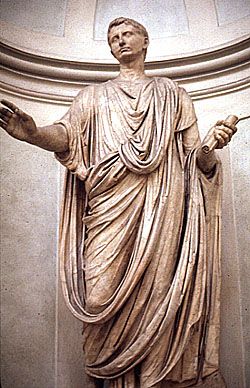Today, April 18, we celebrate the feast of Saint Apollonius the Apologist (died 186), a Roman Senator and member of the Roman elite. Apollonius had found the truth of Christ, and was unable to deny his faith and confidence in the Lord, earning him a martyr’s death. His heroic defense of the truth, and unwillingness to compromise his beliefs to save himself, is an example and inspiration to both civic leaders and the faithful throughout the world!
Apollonius had spent years in study and was extremely familiar with the major philosophers and schools of thought in the second century Roman empire. He developed an interest in the Jewish scriptures and this led him to Christian writings. Eventually, Apollonius converted to Christianity because of the witness and testimonies of the early Church members, but continued to study the beliefs and convictions of those he had left behind, hoping to bring them to conversion with himself. As a member of the Roman Senate, he knew well the law forbidding the practice of Christianity. However, he felt drawn to live a life rich in the grace and love of Christ, and was confident that the Roman rulers would not punish him for this.
Apollonius had been baptized, fully embracing his faith. During this period of time, the Emperor Commodus had informally halted the persecution of Christians, out of regard for his Empress Marcia, who was an admirer of the Faith. The laws of his father, Marcus Aurelius, who had persecuted Christians, had not been repealed officially, however. Therefore, when one of Apollonius’ slaves publicly accused him of being a Christian, he was arrested under the laws of the time. The slave, for his part, was condemned to have his legs broken, and also be put to death, as the anti-Christian laws of Marcus Aurelius also ordered the accusers of Christians to be put to death.
Apollonius was brought before the courts to defend himself. As Perennis, the Praetorian prefect who had arrested him, brought Apollonius to his trials he pleaded with him to renounce his faith. He insisted that if he said the words and apostatized, even if he "didn't mean it,” those in power were all too willing to find him not guilty of the crime. He reminded Apollonius that the punishment for being a Christian was death and insisted that the right course of action for a senator like Apollonius was to renounce his faith and maintain his influence and power in the world.
Apollonius, of course, refused to renounce his faith before the court, and was led to the Senate to defend himself before his peers. This was the moment that Apollonius had been counting on, and he eloquently testified to his faith before his friends and colleagues. He ended his great testimony by praying, "O Lord Jesus Christ, give us a bit of your spirit so that we might be helped to obey your teachings to: make peace over anger, join in pity with others and for others, temper our desires, always increase in love, put away our sorrow, cast aside our foolish pride, not love vengeance, and not fear death. Help us to trust our spirit to God the Father who lives and reigns with You and the Holy Spirit now and forever."
Perennis, as well as his fellow Senators, could not understand why Apollonius wasn't taking the easy and reasonable way out of death and yelled at him, "Are you determined to die today?"
Apollonius responded, "Oh no." He continued, "I very much enjoy life but my love of life does not make me afraid to lose it. There's something better waiting for me: eternal life! There is something better given to the person who has lived well on earth."
Apollonius admonished the listening crowd to cast aside their pride and self-obsession, but they were unwilling to pay the price of faith. He was convicted for his crime not because the senate was willing to convict one of its own but because he was unwilling even to pretend not to trust God. For his crime his legs were crushed and he was beheaded. He died a martyr who had been given a rare chance to preach the Gospel to his executioners.
Saint Apollonius’ Apologia, or defense of the faith, is considered one of the most priceless documents of the early Church. Four separate sources record his historical debate in front of the Roman Senate, including Saint Eusebius and Saint Jerome, as well as Greek and Armenian texts which were discovered late in the 19th century.
The Roman Martyrology records the martyrdom of Saint Apollonius as follows:
At Rome, commemoration of Saint Apollonius, philosopher and martyr. Under the Emperor Commodus, he defended, before the Prefect Perennius and the Senate, the cause of the Christian faith in a finely argued address, and then, after being condemned to death, confirmed it by the witness of his blood.
The life of Saint Apollonius is a courageous reminder for each of us, that earthly money, power, and prestige pale in comparison to the riches and rewards that await us in heaven. As we approach Good Friday, we might consider more fully and deeply that which ties us to the earth, certain in the fact that our Lord and Savior gave up all earthly connections—including those to his friends, followers, and Blessed Mother—to die for our sins, ensuring our everlasting peace and happiness in the next life.
Year 2: Day 108 of 365
Prayer Intentions: Courage and willingness to sacrifice.
Requested Intentions: Financial ability to send children to school (S); Safe return of a runaway (J); Healing of a family (J); Reconciliation of marriage (S); Healing of a daughter with congenital heart disease (F); Healing and an end to suffering (J); For the children (M); For a son fighting a rare immune system disease (R); Freedom from imprisonment (J); Employment and end to depression (H); Successful employment (A); Health for a soon to be delivered baby (T); Financial security (L); Healing of tooth pain (A); Health of expectant mother and child (R); Purification of the souls in Purgatory (A); Guidance in studies (J); Healing and security for a displaced family (C); Healing of high blood pressure; Recovery of brother following surgery (A); For a sister in trouble, that she may make better decisions in the light of Christ (M); Health of expectant mother and child (R); Attainment of funds for surgery (J); Freedom from financial difficulties (E); For employment and college acceptance (E); Recovery and healing of a friend (C); For successful outcome to surgery (C); Healing for brother (M); Successful employment (C); For the victims of the Japanese tsunami/earthquake (J); Healing (E); For a son struggling with depression (B); Successful conception (M); Freedom from social anxiety; confidence in the Lord (J); Improved success in employment and studies (D); Freedom from illness (T); For a wife’s employment (E); Healing of a husband’s knee (M); Freedom from sickness (R); Healing (C); Restoration of marriage (F); Freedom from medical difficulties, employment, successful relationship (D); Healing of a father following stroke (S).
Why pray the Rosary every day for a year?
Each time the Blessed Virgin has appeared-- whether it be to Saint Bernadette Soubirous at Lourdes; to Lucia, Jacinta, and Francisco at Fatima; or to Mariette Beco at Banneux-- she has asserted the importance, saving grace, and power of praying the Holy Rosary on a daily basis. Based upon her words, the Rosary is penance and conversion for sinners, a pathway to peace, an end to war, and a powerful act of faith in Jesus Christ. Pope Paul VI presented the Rosary as a powerful means to reach Christ "not merely with Mary but indeed, insofar as this is possible to us, in the same way as Mary, who is certainly the one who thought about Him more than anyone else has ever done."
To show us how this is done, perhaps no one has been more eloquent than the great Cardinal Newman, who wrote: "The great power of the Rosary consists in the fact that it translates the Creed into Prayer. Of course, the Creed is already in a certain sense a prayer and a great act of homage towards God, but the Rosary brings us to meditate again on the great truth of His life and death, and brings this truth close to our hearts. Even Christians, although they know God, usually fear rather than love Him. The strength of the Rosary lies in the particular manner in which it considers these mysteries, since all our thinking about Christ is intertwined with the thought of His Mother, in the relations between Mother and Son; the Holy Family is presented to us, the home in which God lived His infinite love."
As Mary said at Fatima, "Jesus wants to use you to make Me known and loved. He wishes to establish the devotion to My Immaculate Heart throughout the world. I promise salvation to whoever embraces it; these souls will be dear to God, like flowers put by Me to adorn his throne."

Subscribe to:
Post Comments (Atom)













0 comments:
Post a Comment
Thanks for leaving a comment. If you wish to submit a prayer request, however, please do so above, using the "Contact" tab.